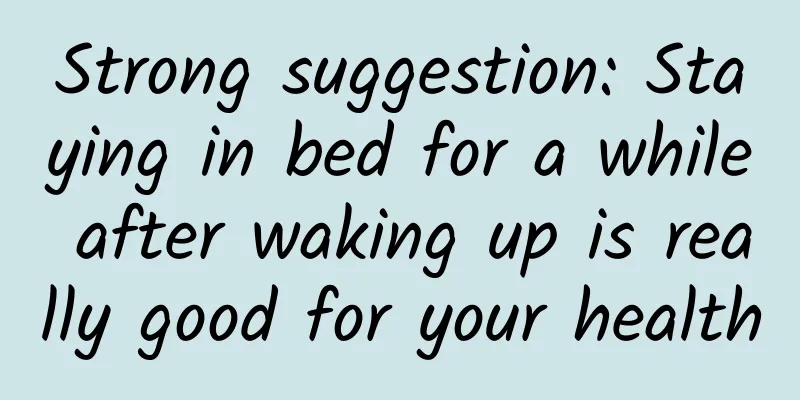Strong suggestion: Staying in bed for a while after waking up is really good for your health

|
What happens when the alarm goes off? You turn off the alarm, get up quickly, rub your sleepy eyes and run to the bathroom... But isn't this against human nature? Thinking of the many headaches I'll have to face once I open my eyes, I'd better close my eyes and sleep a little longer. The weather is getting colder and colder, and I have no courage to get up. It's not that I'm lazy, even the latest scientific research says so. Staying in bed for 30 minutes after waking up in the morning is good for your health On October 17, 2023, researchers from Stockholm University in Sweden published a paper titled "Issnoozinglosing? Why intermittent morning alarms are used and how they affect sleep, cognition, cortisol, and mood" in the Journal of Sleep Research, stating: Compared with waking up immediately after the alarm goes off in the morning, setting a recurring alarm and taking a 30-minute nap after the first alarm goes off may improve cognitive performance and reduce physical fatigue and emotional state throughout the day. [1] Image source: unsplash.com The study is divided into two parts. In the first part, the researchers collected sleep data from 1,732 participants with an average age of 34, of which 66% were women, in the form of a questionnaire survey, and found that 69% of them would use the repeat function of the alarm clock or set multiple alarms, with an average interval of 8 minutes between each alarm clock. After the alarm clock rang, they would stay in bed for an average of 22 minutes. The study also found that young people prefer to stay in bed, while older people are more able to get up immediately after the alarm rings. Comparing the two groups, the average age of those who like to stay in bed is 6 years younger; and they are more likely to be late sleepers, with the proportion of late sleepers being 4 times higher than those who do not stay in bed. People who stay in bed also take a slightly shorter nap on weekdays, an average of 13 minutes less than those who do not stay in bed. However, there was no difference in sleep quality between the two groups. Image source: unsplash.com The second part of the study included some carefully designed experiments, and the subjects were also narrowed down to 31 people who like to stay in bed. The researchers measured the subjects' (subjects undergoing experiments or tests in psychological experiments or psychological tests) sleep quality, cognitive ability, cortisol levels and emotional state. The results showed that these subjects who liked to stay in bed performed better on cognitive ability tests within 40 minutes after waking up, and their physical fatigue and sleepiness were improved. Their mood also improved significantly as the wakefulness time increased - compared with just waking up, they were more sociable and more optimistic 40 minutes after waking up. Therefore, researchers believe that staying in bed for 30 minutes after the alarm rings will not have a negative impact. Instead, it can help people who are drowsy in the morning wake up completely and improve their cognitive performance, physical state and emotional state after waking up. Image source: unsplash.com Staying in bed a little longer after the alarm goes off in the morning is good for your health because it allows us to wake up gradually instead of waking up suddenly from deep sleep or REM sleep. Waking up gradually is more beneficial for our brain and body. This is because when the human body is in a sleeping state, the heartbeat slows down, blood circulation slows down, body temperature drops, and metabolism slows down; after waking up, it takes a process for the human body to switch from the inhibited state during sleep to the excited state. When we just wake up, our alertness and cognitive abilities are reduced, our perception and motor abilities are reduced, and our emotional regulation abilities are not awakened, so many people will feel "grumpy when we wake up". Moreover, if we jump out of bed immediately after the alarm goes off, our body may not be able to adapt in time, and we may easily experience symptoms such as dizziness, palpitations, and postural hypotension. For patients with hypertension, this may even lead to unexpected cardiovascular diseases. Staying in bed for a while can give the cardiovascular system a chance to adapt gradually, and it can also be a wake-up signal to the muscles and joints throughout the body. After getting up, you can also try sitting in bed for a while, moving your limbs, neck, and joints to get your body into working order, and then slowly get out of bed when you feel your body is responding normally. Image source: unsplash.com Winter is coming, how to stay in bed scientifically? Winter is here. The bed is too warm and the outside air is too cold. Especially in the southern region, which is attacked by damp and cold air as soon as winter comes and has no heating, it is simply "difficult to get up in the morning in winter, as difficult as going to the sky." At the same time, winter is also a high incidence period for various cardiovascular and cerebrovascular diseases, especially in the coldest three months from December to February of the following year. If you get up too quickly between 5 a.m. and 9 a.m., the body's blood supply will be insufficient, which may cause symptoms such as orthostatic hypotension, palpitations, and fainting. Therefore, it is very important to know how to stay in bed scientifically in the mornings in winter. Here are some suggestions for those who want to stay in bed scientifically: 1 Ensure adequate sleep time and avoid staying up late Staying up late, staying up late, and not getting enough sleep for a long time will lead to a disorder of the body's immunity, which is bad for health. For those who can't get out of bed in the morning, staying up late and staying up late the day before will make it even harder to get out of bed the next day. It is recommended to go to bed around 10pm, don't play with your phone, close the curtains, dim the indoor lights, listen to some soothing music, do some meditation, relax your body and mind, and fall asleep as soon as possible. 2 Reduce anxiety when waking up Many people worry about not being able to get up in the morning, so they set multiple alarms for themselves, one every 3 to 5 minutes. However, if you worry too much about not being able to get up the next morning, the quality of your sleep the night before will also be affected. Instead of struggling to get up in the morning, it is better to give yourself some time to stay in bed. 3 Don’t stay in bed too long It is advisable to stay in bed for 30 minutes, which is beneficial for the body to restore normal physiological functions. However, staying in bed too long may inhibit the functions of the brain and body, and re-entering the sleep state will be detrimental to wakefulness. 4 Don't stay in bed when you're hungry Don't stay in bed when you are hungry. It is recommended to get up and eat breakfast in time. This is because staying in bed when you are hungry may cause hypoglycemia, gallstones, gastritis, gastric ulcers and other diseases, which are not good for health. So don't stay in bed when you are hungry. 5 Don't stay in bed when you have the urge to urinate or defecate Because holding urine for a long time will make the bladder lose elasticity and damage kidney function; and holding feces for a long time is a burden on the intestines and anus, increasing the risk of hemorrhoids, cardiovascular and cerebrovascular diseases, lower extremity venous thrombosis, lumbar disc herniation, colorectal cancer, and causing habitual constipation. Therefore, when you feel the urge to urinate or defecate, you must get up in time and go to the bathroom to empty the urine in the bladder and the feces in the rectum. 6 After waking up, move your body in bed first After staying in bed for a while in the morning, when you wake up, you don’t have to rush to get up. Instead, stretch, sit on the edge of the bed for a while, and move your neck, limbs, waist, wrists, and ankles, which is good for awakening your body functions and mental state. References [1]https://onlinelibrary.wiley.com/doi/10.1111/jsr.14054 Author: Zeng Xinyue, a popular science writer Reviewer: Li Jingjing Professor and Chief Physician, Department of Neurology, Beijing Tiantan Hospital |
<<: Common diseases in autumn and winter: COPD
Recommend
What is a physiological ovarian cyst? Three symptoms to watch out for
Ovarian cyst is a common disease of the female re...
What symptoms will the pregnant mother have if the fetus stops
The early stages of pregnancy are very important,...
Why is BYD called Highway Danke? How to set up BYD charging
BYD has always adhered to the development concept...
What causes belly button pain during pregnancy?
As we all know, a pregnant woman is no longer an ...
B-ultrasound monitoring ovulation monitoring method
B-ultrasound is a very common examination method....
Will hcg100 cause ectopic pregnancy to rupture?
Ectopic pregnancy is also a common pregnancy cond...
Psychological experts help you to adjust psychologically for the college entrance examination
Examination is an important psychological stress ...
Can pregnant women take Xiao Chaihu Granules?
Pregnant women must be careful about the use of m...
I got pregnant 3 days before my period.
If the pregnancy test stick was white 3 days befo...
A faint watermark on the pregnancy test paper
The instructions for use may give a detailed intr...
I can tolerate being drunk, but I can’t tolerate being drunk on tea!
We all know that drinking tea can refresh the min...
Acupuncture is one of the effective methods for treating dysmenorrhea
Dysmenorrhea is a common symptom among women. Som...
Female leg pain during sleep at night
Many women experience leg pain when they sleep at...
What to do if there is yellow discharge after abortion
With the continuous progress of society, people&#...
What is the reason for the hymen to fall off?
It takes a process to grow from a girl to a woman...









